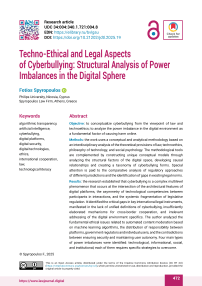Techno-Ethical and Legal Aspects of Cyberbullying: Structural Аnalysis of Power Imbalances in the Digital Sphere
Автор: Spyropoulos F.
Журнал: Journal of Digital Technologies and Law @lawjournal-digital
Статья в выпуске: 3 (3), 2025 года.
Бесплатный доступ
Objective: to conceptualize cyberbullying from the viewpoint of law and technoethics; to analyze the power imbalance in the digital environment as a fundamental factor of causing harm online. Methods: the work uses a conceptual and analytical methodology based on an interdisciplinary analysis of the theoretical provisions of law, technoethics, philosophy of technology, and social psychology. The methodological tools are complemented by constructing unique conceptual models through analyzing the structural factors of the digital space, developing causal relationships and creating a taxonomy of cyberbullying forms. Special attention is paid to the comparative analysis of regulatory approaches of different jurisdictions and the identification of gaps in existing legal norms. Results: the research established that cyberbullying is a complex multilevel phenomenon that occurs at the intersection of the architectural features of digital platforms, the asymmetry of technological competencies between participants in interactions, and the systemic fragmentation of legislative regulation. It identified the critical gaps in key international legal instruments, manifested in the lack of unified definitions of cyberbullying, insufficiently elaborated mechanisms for cross-border cooperation, and irrelevant addressing of the digital environment specifics. The author analyzed the fundamental ethical issues related to automated content moderation based on machine learning algorithms, the distribution of responsibility between platforms, government regulators and individual users, and the contradictions between ensuring security and maintaining user autonomy. Four main types of power imbalances were identified: technological, informational, social, and institutional; each of them requires specific strategies to overcome. Scientific novelty: for the first time, the article proposed a comprehensive approach to analyzing cyberbullying as a structurally determined abuse of digital power through the prism of technoethics. The developed conceptual models provide new tools for understanding the distributed nature of responsibility in the digital ecosystem and forming ethically sound prevention strategies. The author introduced a concept of information misuse as a central mechanism of systematic abuse of power in the digital environment. Practical significance: the research is aimed at legal scholars, public officials, and digital platform developers. It offers practical solutions in the fields such as ethical audit of algorithms, creation of hybrid moderation systems involving artificial intelligence and humans, formation of international task forces, and development of human rights-based principles of digital literacy. The author’s proposals may help to create a safer, more accountable and inclusive digital environment for all participants.
Algorithmic transparency, artificial intelligence, cyberbullying, digital platforms, digital security, digital technologies, ethics, international cooperation, law, technological literacy
Короткий адрес: https://sciup.org/14134126
IDR: 14134126 | УДК: 34:004:340.1.721:004.8 | DOI: 10.21202/jdtl.2025.19


